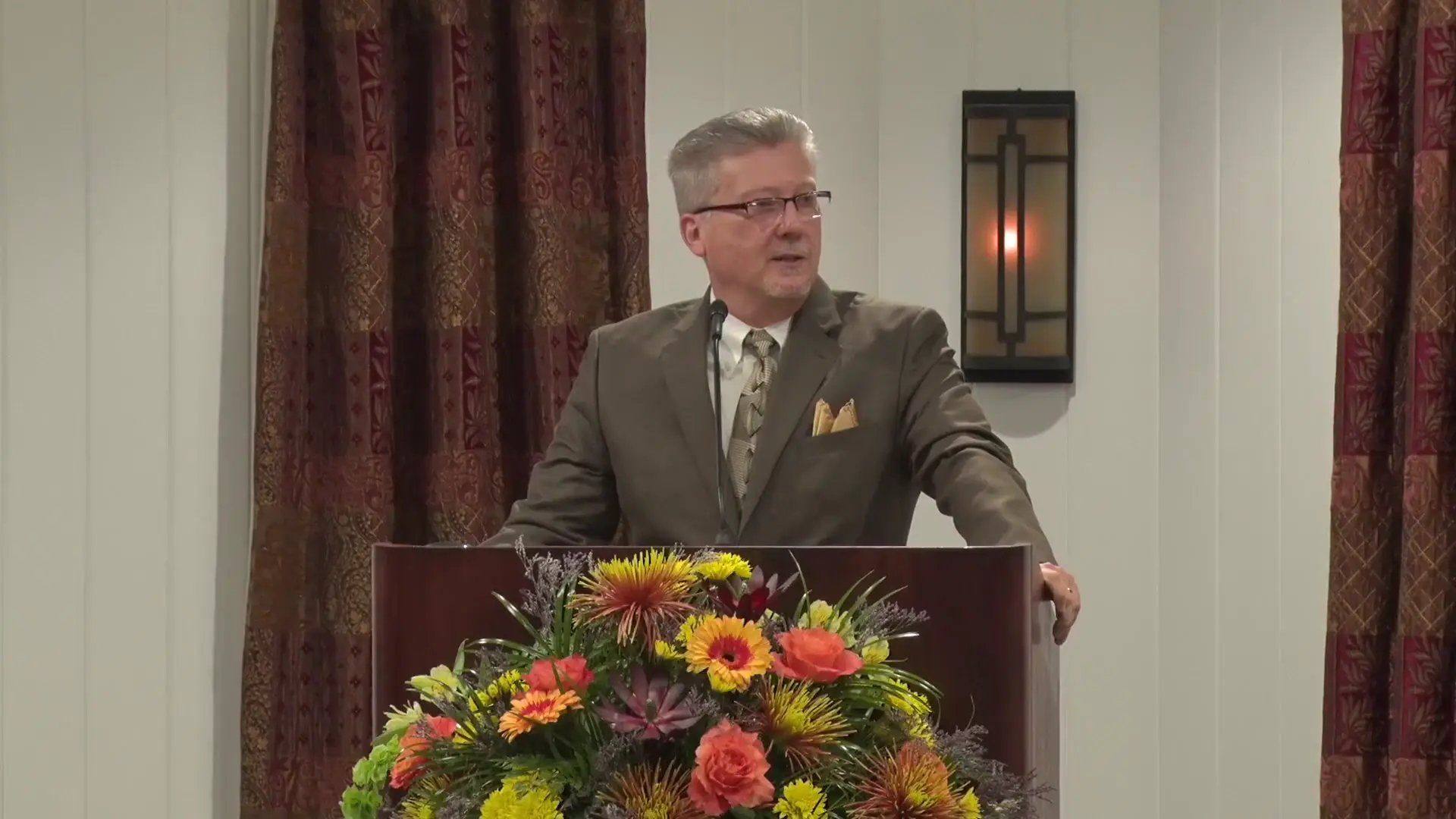Day of Atonement - Sermons, Bible Studies, Articles, and Essays

Holy Days: Atonement
Bible Study by Richard T. RitenbaughThe Day of Atonement depicts the accomplishment of spiritual cleansing leading to salvation for those coming out of the Great Tribulation and Day of the Lord, beginning with the remnant of Israel. Atonement is the most solemn of the seven festivals, where Christians fast and afflict their souls to show that only when man sees himse
The Day of Atonement and Israel's Future
Sermonette by David C. GrabbeThe cleansing of Joshua's filthy robes in Zechariah 3 is a future application of the cleansing in Leviticus 16, when Jesus Christ cleanses Israel in the future.
What We Can Learn From This Day of Atonement
Sermon by John W. RitenbaughThe Day of Atonement addresses the legal, spiritual, and practical moral aspects of restoring God's government while ensuring that rebellion will not recur among beings of free moral agency. It cohesively encapsulates these themes, presenting an overarching view of reconciliation. Atonement healing the separation caused by sin, whi
Reconciliation and the Day of Atonement
Sermon by John W. RitenbaughThe Day of Atonement holds a profound significance in the journey toward reconciliation and restoration. It addresses the legal, moral, and practical aspects of restoring God's government while ensuring that rebellion will not recur among beings of free moral agency. Unlike Passover, which focuses on personal reconciliation of the

Pride, Humility, and the Day of Atonement
'Personal' from John W. RitenbaughThe Day of Atonement is a significant observance where God's instruction for its observance is found in Leviticus 23:27-32. The day is associated with self-affliction, which is designed to promote humility. This self-affliction is often accompanied by fasting, though fasting is not directly commanded in scripture for this day. The
The Peculiarities of Atonement
CGG Weekly by Richard T. RitenbaughThe Day of Atonement stands out as the most unusual holy day of the year, marked by distinctive practices that carry profound spiritual significance. Fasting, or afflicting our souls, is a central aspect of this day, teaching us how dependent we are on God, who supplies everything we need for life every moment. This realization ext
The Unity of Atonement
Sermonette by Austin Del CastilloWe fast to learn humility, sacrifice, and empathy towards our Savior, who had His blood shed and who bore our sins, being forsaken for our sakes.
Why Two Goats on Atonement? (Part Two)
CGG Weekly by David C. GrabbeThe Day of Atonement held a unique significance in the symbolic removal of sins among the Israelites. This annual ceremony served as a reminder of all the sins for which sin offerings were brought throughout the year, as the accumulated iniquity was symbolically addressed. God commanded the high priest to cleanse the incense altar
The Price of Atonement
CGG Weekly by Richard T. RitenbaughThe Day of Atonement, often thought of as the Fast, is properly named in Leviticus 23:27-28, where it is emphasized as a holy day devoted to atonement. This special day, also called Yom Kippur by the Jews, centers on the concept of covering, derived from the Hebrew word k&257;par, which means to atone, to propitiate, or to wipe cle
Atonement: Physical and Spiritual Cleansing
Sermonette by Ryan McClurePhysical fasting provides insights to a parallel spiritual process of cleansing and removal of sin. Our High Priest commands us to let go to lighten our burden.
Why Two Goats on Atonement? (Part One)
CGG Weekly by David C. GrabbeEach year on the Day of Atonement, the high priest performed an elaborate ceremony involving four sacrificial animals as detailed in Leviticus 16. He offered a ram as a burnt offering, a bullock as a sin offering for himself and his household, and two goats together as a sin offering for the nation. These two goats are central to t

Jesus in the Feasts (Part Four): Atonement
Sermon by Richard T. RitenbaughIsaiah 53 and passages from the New Testament substantiate Christ's dual role in shedding His blood and bearing away sins, thereby reconciling humanity to God.

The Fall Holy Days
Article by John ReissThe four autumnal holy days - Trumpets, Atonement, Tabernacles, and the Eighth Day - generally represent God's plan of salvation for humanity.

Deuteronomy, Land Sabbaths, Atonement, and Third Tithe
Sermon by Ryan McClureWhat has come to light regarding reading Deuteronomy, the year of release, the Day of Atonement, the third tithe year, and Passover.
Limited Atonement
Sermon by Richard T. RitenbaughThe prospect of atonement and salvation is available to everybody, but only those called by the Father—not by an evangelical altar call—are eligible.

Why Is Atonement a Fall Festival?
Sermon by Richard T. RitenbaughThough Passover and Atonement both deal with Christ's sacrifice, several reasons emerge to make Atonement a better fit for the fall holy days.
An Offering, Sanctification and Atonement
Sermonette by John W. RitenbaughWe will reap what we sow; if we sow in fear, we will reap fear, but if we sow in faith, trust, and love, we will reap spiritual and physical abundance.
What is Atonement?
Sermon by John W. Ritenbaugh (1932-2023)Man's estrangement from God is wholly man's fault. Atonement denotes the way harmony is achieved, making the entire world at one or reconciled with God.
Are God's Holy Days To Be Kept Today?
Sermon/Bible Study by Martin G. CollinsIf we do not keep God's holy days, we will deprive ourselves of the knowledge of God's purpose. Jesus and the first century church observed and upheld these days.
God's Holy Days - Our Shared Vision Of Hope
Feast of Tabernacles Sermon by Mark SchindlerFrom Passover to Pentecost to Trumpets to Atonement to the Feast of Tabernacles, these days should solidify our vision of he Father, Jesus, and one another.
Sins Borne Away
Sermonette by Richard T. RitenbaughThe Day of Atonement represents both a blood sacrifice for covering/cleansing and a means of removing sin permanently from the camp of Israel.
The Two Goats of Leviticus 16
Sermonette by David C. GrabbeThe first goat is a blood sacrifice to cleanse the altar. The second goat—the 'azazel' or 'complete removal'—is led away and freed (not bound by a chain).
Is Barabbas the Fulfillment of the Scapegoat?
CGG Weekly by David C. GrabbeBecause of Matthew's inclusion of a number of Day of Atonement-related symbols, one theory holds that Barabbas was a type of the scapegoat (azazel).
Who Fulfills the Azazel Goat— Satan or Christ? (Part Five)
'Ready Answer' by David C. GrabbeWhile the church of God has long taught that the azazel goat of Leviticus 16 represents Satan, this traditional view has no biblical support.

Who Fulfills the Azazel Goat—Satan or Christ? (Part One)
'Ready Answer' by David C. GrabbeSome say the scapegoat (azazel) prefigures the Devil, others say it has been fulfilled by Jesus. Tradition teaches one thing; Scripture reveals another.

Azazel: Beginnings
Sermon by David C. GrabbeWhile there is a handful of common starting places for understanding the azazel, none of them has multiple witnesses of Scripture. We must begin elsewhere.

Who Fulfills the Azazel Goat— Satan or Christ? (Part Three)
'Ready Answer' by David C. GrabbeHebrews 9 and 10 clarify the Atonement ritual of Leviticus 16. The author makes no mention of Satan, but says that Jesus bears our sins like the azazel goat.

Who Fulfills the Azazel Goat—Satan or Christ? (Part Two)
'Ready Answer' by David C. GrabbeOn the Day of Atonement, the live goat bears the sins of the nation. Many think this represents Satan as the source of sin, yet Scripture reveals the truth.

Azazel: Endings
Sermon by David C. GrabbeOne goat had to die for cleansing; the other goat had to remain alive for bearing the sins away. Jesus fulfilled both roles. Satan's binding atones for nothing.
Understanding the Azazel Goat
Sermonette by David C. GrabbeThe goat for azazel (complete removal) bore the sins of the nation out of sight. Jesus Christ likewise had our iniquities laid on Him, and He bore them.
Hebrews 10:9 - Sacrificial System or Old Covenant?
Sermonette by Charles Whitaker (1944-2021)Hebrews 10:9 does not say that God's law or the Old Covenant has been done away, but that the system of animal sacrifices has been set aside for now.
Inventing Goddesses and Demons (Part Three)
CGG Weekly by David C. GrabbeSome modern translations of Leviticus 16 assert that the live goat (scapegoat) was a sacrifice that God commanded Israel to send to a demon named Azazel!
Humbleness is Our Only Path to Holiness
Sermonette by Bill OnisickFor to come near to God, we must be thoroughly cleansed inside and out. Self-affliction, enabled by fasting, creates humility—the only path to holiness.
The Doctrine of Israel (Part Fourteen): Israel Redeemed
Sermon by Richard T. RitenbaughGod employs a winnowing process in selecting those who will enter the Millennium. The process includes punishment for Israel's failure to serve as priests.
Jesus Christ, the Bearer of Sin
Sermonette by David C. GrabbeThe Messianic prophecy in Isaiah 53, plus the testimony of Peter and the author of Hebrews, show that Jesus fulfilled the azazel goat's role by bearing sin.
Who Fulfills the Azazel Goat— Satan or Christ? (Part Four)
'Ready Answer' by David C. GrabbeThe Day of Atonement is not fulfilled with the binding of Satan. Rather, there are numerous prophecies of God atoning for the sins of physical Israel.
Fasting and Reconciliation
CGG Weekly by John W. RitenbaughFasting makes us feel helpless and weak, producing humility. Only then will we listen with the intensity needed to believe, repent, and submit to God.
Devil in the Details?
CGG Weekly by David C. GrabbeA mysterious commentary has been used and repeatedly re-quoted as a proof that the azazel goat represents Satan. This source warrants closer inspection.
Led Outside the Gate
CGG Weekly by David C. GrabbeJesus permitted Himself to be sent by the leaders and led by their agents in true meekness, submitting to the Father's will, even cleansing those who led Him.
Why Trumpets?
Sermonette by James BeaubelleThe Feast of Trumpets depicts a time when angelic beings sound an alarm, warning God's saints to prepare to put themselves under His sovereign rule.
Fasting
Sermonette by James BeaubelleThe best offering we can present is a humble and contrite heart, attainable through fasting, if done without pride and self-seeking.
All Flesh Shall See the Salvation of God
Sermon by Martin G. CollinsMoral failure compounds when self-loathing sabotages happiness. Only atonement can turn this depression around, providing the comfort of mental and spiritual health.
Who Is Responsible For Sin?
Sermonette by David C. GrabbeThough Satan influences, the choices an individual make are totally his own, even for those without God's Spirit. We sin when we are drawn away by our own desires.
An Intimate Expanding Relationship
Sermon by Mark SchindlerWe must trade our impulsive and capricious carnal natures for a controlled, sacrificing nature, imitating Christ in an intimate, expanding relationship.

Why Was Jesus Not Crucified as Passover Began? (Part One)
'Ready Answer' by David C. GrabbeThe gospels show Jesus observing the Passover at the beginning of the 14th. Should we use the time when He observed it or the time He died as our guide?

Afflicting Our Souls
Sermon by Richard T. RitenbaughJesus taught that fasting is an internal, spiritual good work, done in the inner self. Any other kind of fasting has little or no spiritual value.
Poor in Spirit (1997)
Sermon by John W. RitenbaughBeing poor in spirit is a foundational spiritual state for qualifying for God's Kingdom. Poor in spirit describes being acutely aware of one's dependency.

The Cursed Redeemer
Sermon by Richard T. RitenbaughHanging on a tree was designated the punishment for the worst kind of sin. Jesus was hung on a tree, having fulfilled the curse of the law for us.
Eucatastrophe
Sermonette by Richard T. RitenbaughEucatastrophe is an unraveling that ends up good. The Bible contains a number of eucatastrophes, including the death of Christ, a tragedy that turns into good.
Foolishness and Cleansing
Sermon by John W. RitenbaughHuman nature has a perverse drive to take risks, pushing the envelope, taking unwise chances, foolishly gambling away the future. Foolishness is sin.
A Footnote on the Start of Christ's Ministry
Sermonette by David C. GrabbeWhen the angry members of the local synagogue tried to push Jesus over the cliff, they paralleled the Jewish tradition for the azazel goat.
How Do We Keep God's Festivals?
'Ready Answer' by Richard T. RitenbaughHere are the foundational principles to keep in mind in observing the Feasts of God throughout the year.